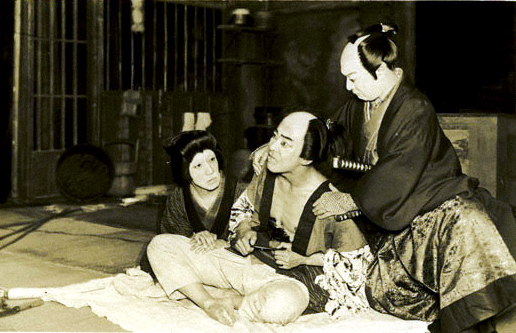| YASAKU NO KAMABARA |
| Play title | Iroha Gana Shijűshichi Moji [1] |
||||||||||||||||
| Common title | Yasaku no Kamabara [2] |
||||||||||||||||
| Author | Nagawa Shimesuke I | ||||||||||||||||
| History |
Nagawa Shimesuke I's chűshinguramono "Iroha Gana Shijűshichi Moji" was premiered in ďsaka in the 9th lunar month of 1791 at the Kado no Shibai [more details]. The role of Yasaku, which was minor in Nagawa Shimesuke I's drama, became very important when it was performed by the Kamigata star Nakamura Utaemon III in the 7th lunar month of 1812 at the Nakamuraza in the drama "Taiheiki Chűshin K˘shaku". This role was transmitted by Nakamura Karoku III, the son of an important disciple of Nakamura Utaemon III, to his son Nakamura Kichiemon I, who put it in his collection of dramas Shűzan Jisshu. |
||||||||||||||||
| Structure |
The original drama was made up of 10 acts, divded into 25 scenes. The scenes with Yasaku were the 6th act of "Iroha Gana Shijűshichi Moji". The current structure is made up of 3 scenes: |
||||||||||||||||
|
|||||||||||||||||
| Key words |
Adauchi Adauchimono Ak˘ R˘shi Chűshinguramono Daikan Giri/Ninj˘ Gishi Gishigeki Gishi Ky˘gen Hyakush˘ Kama Kamabara R˘nin Senzaki Yagor˘ Seppuku Settsu Shijűshichishi Shűzan Jisshu Tepp˘ |
||||||||||||||||
| Summary |
Hyakush˘ Yasaku Sumai The r˘nin Senzaki Yagor˘ [3], one of the 47 r˘nin of Ak˘, calls on his brother, the farmer Yasaku at his home in the village of Kanzaki in the province of Settsu. The purpose of his visit is to say farewell to Yasaku and his wife Okayo as he is soon going to Edo with other members of the vendetta group to avenge their lord En'ya Hangan, who drew his sword, attempted to kill the high-ranking master of ceremony K˘ no Moron˘ and was forced to commit seppuku. Yagor˘, as well as all other members of the group of faithful retainers, is not allowed to talk about their final trip to anyone, not even their closest relatives, for if the plan is known to the Kira clan, their attempt will most likely fail. Yasaku tells his brother that, while he was absent, the local daikan Shibata Shichidayű [4] has made an arrangement for Yagor˘ to be adopted by another wealthy daikan named Innami Sezaemon as his heir and marry his daughter. Yasaku, without consulting Yagor˘ has agreed to Shichidayű's proposition, considering it a great honor for Yagor˘ to become the heir of a daikan. When Yasaku tells Yagor˘ of the wedding arrangement, Yagor˘ tells his brother that he can never accept it for a confidential reason. So, Yasaku, after making his wife Okayo go to buy some sake, asks Yagor˘ why he refuses to accept such a favorable offer. Yagor˘ then reveals the true reason on one condition: Yasaku will never tell it to anybody. Yasaku has to swear on the buddhist memorial plaques of their late parents. Once the truth is told, Yasaku understands that the wedding is no more possible. Shibata Shichidayű Yashiki Yasaku arrives at Shibata Shichidayű's home. The daikan is very happy as he has received 100 ry˘ from Sezaemon. His happiness is turned into anger when Yasaku tells him that the wedding is no more possible. Shichidayű furiously threatens to commit seppuku as he is a samurai who has lost his honor. Yasaku is compelled to tell Shichidayű the true reason for the breach of the wedding promise. Shichidayű orders Yasaku to bring Yagor˘ at his residence as soon as possible. Moto no Yasaku Sumai Yasaku goes back home. He is not very clear in his explanation. Yagor˘ thinks that Yasaku has told everything to the daikan. If this is the case, he has to kill Shichidayű and commit seppuku to atone for his deeds. Yasaku persuades Yagor˘ that the promise to keep the vendetta secret has not been broken. He orders Yagor˘ to quickly take a leave but, before letting his brother go, he asks him several question about the way to commit seppuku. The retainer gives all the technical details to the farmer, who is not very familiar with this ritualistic way for a samurai to depart from this world. Then, Yagor˘ leaves his brother's home. Shichidayű suddenly arrives. He is furious as he has wasted time waiting for Yagor˘ and Yasaku. He screams that he will kill both Yasaku and Yagor˘ and that he will also report the revenge plan of the former retainers of the befallen clan to the authorities. Yasaku kills the daikan, shooting him with a hunter gun (tepp˘). Then he commits seppuku, not with a samurai sword but with the only cutting tool available: his own sickle (kama). |
||||||||||||||||
| Notes |
[1] Possible others readings of this title were "Iroha Gana Shijűshichi Yomi" or "Iroha Gana Shijűnana Moji". [2] "Sickle Suicide by Yasaku" in English. [3] In the puppet play or in some Kabuki versions of "Yasaku no Kamabara", the r˘nin was Kayano Wasuke, not Senzaki Yagor˘, and the village was named Kayano, not Kanzaki. [4] In the late 18th century first version of this drama, the daikan was named Shibamura Shichidayű. |
||||||||||||||||
 |
|
The actors Nakamura Tokiz˘ III, Nakamura Kichiemon I and Band˘ Mitsugor˘ VII playing the roles of Okayo, the farmer Yasaku and Senzaki Yagor˘ in the drama "Yasaku no Kamabara", which was staged in June 1931 at the Meijiza |
|
|
| Contact | Main | Top | Updates | Actors | Plays | Playwrights | Programs | Links | FAQ | Glossary | Chronology | Illustrations | Prints | Characters | Derivatives | Theaters | Coming soon | News |